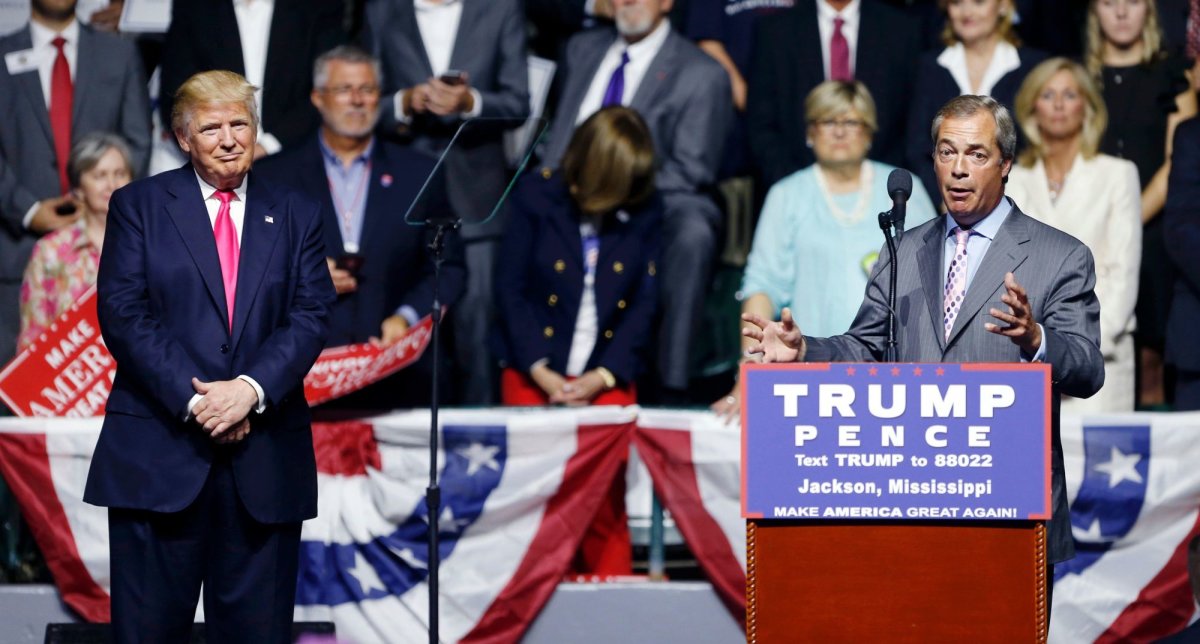
August 2016 | Nigel Farage joins Donald Trump at a campaign rally (Alamy)
9 min read
What can Nigel Farage learn from Donald Trump’s victory in the United States? Harriet Symonds explores how Reform can win the ‘bro vote’ in the UK
One of the many reasons that Donald Trump beat Kamala Harris was because he won the support of a majority of young men.
Among the most striking statistics from early exit polls was that Trump was backed by 56 per cent of men aged between 18 and 29, and just 40 per cent of women of the same age. In other words, Trump smashed the so-called bro vote.
One of his allies has boasted how the campaign targeted college fraternities in swing states to mobilise male students.
Trump’s decision to appear on former Ultimate Fighting Championship commentator Joe Rogan’s podcast – and Harris’ refusal – further underlines the Democrats’ failure to lock down an age demographic that has traditionally always been supportive.
Political experts will no doubt spend years debating the reasons for Trump’s historic comeback and his success at capitalising on youth masculinity.
At its most basic level, Trump knew the best cut-through to younger voters was on social media platforms and podcasts. It’s something Reform UK knows too.
It’s no coincidence that Nigel Farage favours TikTok, X and podcasts over traditional media, appearing on The Winston Marshall Show podcast just last month.
favours TikTok, X and podcasts over traditional media, appearing on The Winston Marshall Show podcast just last month.
Reform was backed by 12 per cent of 18- to 24-year-old male voters at the last general election – two per cent more than the Conservative Party. “We are really trying to tap into that demographic; there is an undercurrent of young men that we’ve noticed that we feel we can tap into,” says one Reform insider.
Farage already has more than one million followers on TikTok – more than any other British politician – and claims two-thirds of his followers are under 35, and half are under 25. He has also, controversially, praised misogynist influencer Andrew Tate as an “important voice” for “emasculated” boys.
There were little kids on bikes as young as eight that were playing in the street shouting: ‘Reform! Reform!’
It’s been widely reported how Trump’s son Barron was crucial in steering his father on which podcasts to appear on, such as Rogan, stand-up comedian Theo Von, YouTube group the Nelk Boys and influencer Logan Paul. Trump’s interview with Rogan – whose audience is 80 per cent male – lasted over three hours and has racked up 52m views on YouTube alone.
“They emphasised more of a masculine, machismo approach – and boy did it work,” Charlie Kirk, co-founder of Turning Point USA, and now adviser to Trump on cabinet appointments, has said. It’s no surprise Reform is already eyeing up Joe Rogan Experience for Farage.
Appearing on a podcast, Kirk revealed elements of Trump’s campaign strategy. “We harvested in a very powerful way. At Arizona State University, for example, we registered thousands of young men to vote in fraternities. That was way easier than us going to try and win over swing voters,” Kirk explains.
Kirk and Vivek Ramaswamy – now co-leading Trump’s new Department of Government Efficiency (Doge) alongside Elon Musk – travelled to universities across the US with their You’re Being Brainwashed tour to “challenge left-wing indoctrination on college campuses”, inviting students to debate them and, crucially, encouraging young Trump supporters to vote.
TikTok clips of their conversations on campuses received over 60m views a day during the election.
For Trump, TikTok was enormously effective at reaching the sorts of people he was trying to win over: the working class, or ‘muscular class’ as Kirk calls it, and the young. “Lower propensity voters get their information on TikTok. They’re not watching CNN. These folks are darn tired by the time they get home. They’re not turning on cable news, they’re watching NFL football games,” he adds.
In an echo of the strategy, Farage’s recent appearance on Winston Marshall’s podcast saw him speak to the former lead guitarist of Mumford & Sons about free speech, tackling illegal immigration, and the Southport riots. Clips were widely shared online. It prompted Reform MP and serial tweeter Rupert Lowe to follow suit, appearing on Marshall’s podcast last week.
 Trump’s America is set to serve as a blueprint for Reform to point to what should – or could – happen in Britain. Farage has said Musk’s Doge in particular will be of keen interest for what the party could replicate. “[Voters] will be able to see evidence of a completely different way of governing, a completely different way of looking at the world compared to what we have in No 10 or Whitehall,” explains Gawain Towler, former spinner for Reform. “We’ll say: ‘Look over there, look what’s going on. Look how their lives are better than yours. There’s a reason for this difference and if you want a bit of that, you’ve got to vote for us’.”
Trump’s America is set to serve as a blueprint for Reform to point to what should – or could – happen in Britain. Farage has said Musk’s Doge in particular will be of keen interest for what the party could replicate. “[Voters] will be able to see evidence of a completely different way of governing, a completely different way of looking at the world compared to what we have in No 10 or Whitehall,” explains Gawain Towler, former spinner for Reform. “We’ll say: ‘Look over there, look what’s going on. Look how their lives are better than yours. There’s a reason for this difference and if you want a bit of that, you’ve got to vote for us’.”
The nephew of American political commentator Tucker Carlson has recently relocated from the US to join Reform UK’s press team and could prove useful as the party moves closer to the Trump way of doing things.
Others are less thrilled by the latest political import from America.
“This is something that I really worry about,” says Natalie Fleet, Labour MP for Bolsover. “I’m a mum of four – two boys and two girls – and the two boys are of impressionable age, they have been brought up by me – who is on the left and an absolute feminist – and yet one of the boys has Andrew Tate as a screensaver.”
She adds: “When we went door-knocking during the general election, there were little kids on bikes as young as eight that were playing in the street shouting: ‘Reform! Reform!’”
So far there is little evidence that Farage is having anything like the same effect as Trump. Overall youth support for Reform has not shifted since the general election, holding steady at around 11 per cent.
Support from 18- to 24-year-olds is relatively evenly split between men and women, according to More in Common, but for 25- to 34-year-olds this begins to diverge – 16 per cent of young men supporting Reform compared to just 11 per cent of young women.
“We’ve seen young men move to parties of the populist or radical right. So, I definitely don’t think it’s impossible, it just hasn’t quite happened yet,” explains More in Common director Luke Tryl.
There is this kind of emerging political phenomenon sweeping across Europe and America. I think Britain is about five years behind
Reports that Musk is preparing to give a £78m donation to Reform UK – another indication of Team Trump’s endorsement – would boost their advertising war chest leading up to the next election.
“One of the things that people clearly like about Trump is that he’s not a career politician – he’s authentic. Even people who say they would never vote for Nigel Farage will say: ‘I do like the fact he says it like it is’,” adds Tryl.
Zoomers like personalities, and polling shows Farage is now the most popular senior politician in the UK, with a favourable rating of 30 per cent. Farage and party chairman Zia Yusuf say one of their main jobs over the next few years will be turning this support into votes at the next election. This could revive ambitions by young party members to set up an official Reform youth branch to capitalise on the support of under-30s, an idea previously shot down due to fears it would cause too much trouble.
“My youngest is on TikTok, and she feels like she knows Nigel Farage better than any politician because he gets cut-through,” explains Fleet.
“All I can see, as a mum, is that it’s borne out of a fear that the world isn’t delivering for them. It’s absolute fear, and it’s not helped by the fact that we had 14 years in this country where we have really struggled.”
In the US, Trump was faced with an electorate that felt worse off than they did four years ago. His campaign messaging was relentless on the economy and immigration – the two leading issues for his supporters (93 per cent and 82 per cent).
“There is this kind of emerging political phenomenon sweeping across Europe and America. I think Britain is about five years behind,” says Charlie Downes, a young Reform member.
Over two-thirds in Britain (68 per cent) say the country is in decline. “There’s no doubt lots of people think that the British dream is imperilled. There’s lots of unhappiness for the status quo, particularly for some young people who see not having those same opportunities to get on the housing ladder, to get well-paid jobs,” says Tryl.
The belief that hard work will be rewarded now rings hollow with many as young people say they do not have the same opportunities that their parents did.
Young men now feel out of place in a society that is rapidly changing. “[It’s about] a sense of purpose, a sense of place, the ability to lay down roots, and especially for young people, the ability to start a family, because the current economic model in Britain is very anti-family,” explains Downes.
This is echoed in the party’s latest motto, ‘Family, Country, Community’, unveiled at a press conference last month where Farage suggested that MPs should debate rolling back the abortion limit – a key issue in the US election.
‘Family, Country, Community’, unveiled at a press conference last month where Farage suggested that MPs should debate rolling back the abortion limit – a key issue in the US election.
Focusing on economic discontent will be crucial. “[Reform] needs to completely break with this kind of outdated Thatcherite economic programme, where it’s all about free markets. Young people, especially, are just not excited by that sort of thing. What we want now is security more than anything,” Downes argues.
In a society where everything feels broken, particularly for young men, populism can look increasingly attractive. Reform’s slogan – ‘Britain Needs Reform’ – is an acknowledgement of that, and some young men see a party willing to listen.
“That sense of being disrespected is something that populist parties in particular can tap into,” explains Tryl.
“If we don’t deliver, then absolutely there will be an increase in the Reform vote,” warns Fleet.
“Our challenge over the next five years is making sure that we absolutely deliver, and we don’t do what the last government did and say we’ve delivered but people don’t feel it.”
With just five Reform MPs in Parliament, Farage is some way off becoming the next British prime minister, but he surely senses the scale of the opportunity in front of him.
Tryl says: “In Britain, we have an electorate which is super volatile. In the last parliament the Tories went from at some point above 50 per cent in the polls, to getting 24 per cent in the election, and sometimes polling as low as 18 per cent. So nothing’s off the table in terms of what the outcome of the next election could be. That clearly creates an opportunity for challenger parties that we haven’t seen before.”
PoliticsHome Newsletters
PoliticsHome provides the most comprehensive coverage of UK politics anywhere on the web, offering high quality original reporting and analysis: Subscribe


